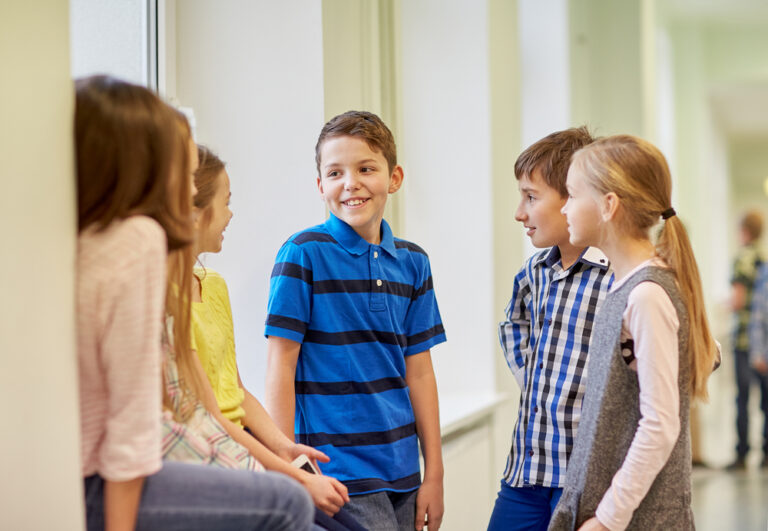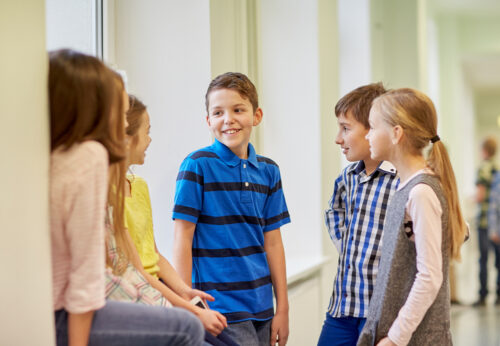Social skills are the tools that we use to effectively communicate with others. This is an extremely important ability that will benefit your child in a variety of ways. From helping them to make friends, to properly following directions and asking questions when they need help, this proficiency should be taught from an early age.
That is because mastering effective communication can be a difficult task. Some children are naturally gregarious while others tend to be more reserved. No matter what side of the spectrum they land on, understanding that conversation is a two way street is the first step. We want our children to recognize that there is a give and take and to be patient during the numerous exchanges they will have each day.
So how do you help your child to build these skills and overcome obstacles along the way? By teaching them the basic principles of communication! Then practice, practice practice!
Top Methods for Teaching Kids Social Skills
#1 – Engage in Their Interests
What topic gets your child excited? Is it dinosaurs? How about Barbies? Or maybe they are a hardcore basketball fan. Whatever it is that sparks excitement in them, use it!
For the dinosaur buff, consider taking them to a museum. Ask them questions. Engage in hands-on activities that the institution offers. Read fun facts about the different species. This allows them to talk about a subject that is meaningful to them.
Many times, communication struggles occur because the child just doesn’t know what to say or is not comfortable responding. We want to remove that unnerving feeling and meet them halfway. If there are certain subjects that make them clam up, try and find sly ways of teaching them about it so that they feel more comfortable.
#2 – Utilize Active Listening
Active listening is the process of completely focusing your attention on the person speaking and understanding what they have to say. In other words, removing distractions, getting down on their level, maintaining eye contact, and concentrating on what the speaker is talking about.
We all want to be seen and heard. This soft skill makes those involved feel valued and facilitates better connections.
#3 – Teach Them to Mind Their Manners
Saying please and thank you can go a long way. So does waiting your turn. Treating others the way we would like to be treated is an important principle in life, but also in teaching social skills.
When issues arise, it is imperative that you address them immediately. Let’s say your son interrupts his sister while she is speaking. Explain why this is rude. Ask him how it would make him feel if his sister were to do that to him. Empathy is a crucial ability in terms of growing positive connections with others as well as knowing how to handle certain situations.
#4 – Let Them Have Friends Over
Kids are much more likely to engage with others when they are in a familiar and comfortable environment. If your child struggles in social situations, consider letting them have a friend over to the house. Find activities for them to do that are exciting and fun.
Creating a safe space for your little one to build these connections without too many obstacles can help their confidence grow and improve their social skills.
#5 – Play Games to Build Social Skills
This is another fantastic way to engage with your little one without adding any pressure. Start early by just making funny faces and playing peek-a-boo with your infant. When they transition to preschool age, engage in sensory play! Playing in the sandbox can be fun and can help them develop their language skills.
As they get older, games like charades, Taboo, Balderdash, and I Spy are all great options to get them talking and interacting with others. Encourage playing for fun and not necessarily for keeping score. Competition can bring out the best in some and the worst in others. Making sure that it is an uplifting experience is key!
#6 – Lead By Example
Children are like sponges. They absorb everything around them and take on many of the traits of the prime individuals in their life. Giving them an example to follow can help guide them on how to hold themselves in their own interactions.
What does this mean? Have good posture, make eye contact, and engage in a positive way. When frustrated, don’t yell. Instead, find proactive solutions. Being an ideal role model can inspire them to act similarly.
#7 – Know When to Take a Break
We all have our limits. This is especially true for children that are introverts or have social anxiety. If your child seems uncomfortable or begins to shut down, end the interaction.
Furthermore, it is important to teach your child that it is okay to walk away. We want them to engage with others, but we all do not want them to feel trapped. Politely ending the conversation or excusing oneself is an easy way to prevent anxiety from worsening.
#8 – Demonstrate the Importance of Sharing
This doesn’t just mean with objects. It also relates to how someone is feeling. Educating your child on why we need to share how someone made us feel when they did something allows them to praise a nice gesture as well as to verbalize an issue.
Acknowledging emotions can give your child a frame of reference. This, in turn, will allow them to better exhibit empathy when a peer is feeling upset. This is an integral part of building and keeping valuable relationships.
Importance of Teaching Social Skills
Social skills are such an important asset. They will help your child to gain confidence, be able to handle arguments more effectively, and even excel in school! In fact, according to a study conducted by the Robert Wood Johnson Foundation, children who exhibit social competence early on in life are more likely to attend college and go on to obtain lucrative job opportunities!
Not only that, but social skills allow your child to make long-lasting connections, have better self-esteem, and can help them to be less likely to succumb to peer pressure as adolescents and adults. Talented communicators tend to be strong, independent individuals who have an increased level of happiness. Helping your child learn these skills will provide them with life-long benefits!
Types of Communication
There are various building blocks that you need to reinforce with your child to help them succeed in creating social connections. Communication is perhaps the most important skill a child needs to help them socialize effectively.
Verbal
Talking — That is what most people equate with the phrase “verbal communication”. However, communication is not just talking. It is engaging with the other participants involved.
However, with children, this is a process that must be taught. First, learning how to speak, then composing sentences, and finally participating in conversations. In order to ensure that your child is comfortable in this type of situation, you have to make sure that their foundation is solid.
Vocabulary
Each day help your child to learn one new word. This seems tedious, but can be easily done while in the supermarket or doing laundry. Show them a new object or point out something that someone is doing. Explain its purpose.
Talk about feelings and why it is important to discuss emotions and not let them get the better of us. One of the biggest frustrations that toddlers, kids, and even teens have in regards to communication is how to handle a disagreement or when someone says something hurtful to them.
The instinct is to yell in order to deflect the situation. Yet, if your child has the right vocabulary to vocalize the problem, they can engage in a productive and positive way.
Volume
Learning volume control is another skill that takes practice. When children get excited or mad, the inclination is to raise their voice. Instead, we want them to utilize inflection and tone. This is easily taught at bedtime when reading them a story.
Read them the same sentence in various ways — loudly, softly, and with emphasis on certain words. Ask them how the meaning changed when you accentuated different words.
Speed
The rate of speed at which someone speaks also plays a big factor in effective communication. If the speed is too fast, no one will understand the message. If it is too slow, you will lose the attention of the audience.
Having them read out loud is a fantastic method to help them develop a rhythm in their speech. It also allows them to hear themself and self-correct the problem!
Positive Reinforcement
Remember that while your little one is building this vocabulary, we want to use positive reinforcement to build their confidence and encourage the communication process. In the instance that they mispronounce a word, do not correct them. Instead, rephrase the sentence. For instance, let’s say your baby’s first word is “spoon,” but they pronounce it “poon”. Respond to them by saying “Yes! You need your spoon to eat!”
Also, keep in mind that there will be times of frustration. Yelling will happen, but as parents, it is our job to never yell back. Get down at their level and explain that raising their voice is not a good way to express their frustrations. We want to use our words to help solve our problems.
Patience is key in these situations. This is a brand new process to them and it is a lot to learn! Make sure they know that they are doing a great job!
Non-Verbal
This refers to how we hold ourselves during a conversation. Studies have shown that non-verbal cues make up 65% of communication. That means that what we do holds more weight than what we actually say. This is why it is extremely important that we educate our kids on how to compose ourselves in social exchanges.
Focus
Eye contact is another key building block. Reinforcing its importance will help your child succeed in social situations. This can easily be accomplished through games and fun activities! Play Peek-a-boo, have a staring contest, or turn them into a tiger with face paint!
Focusing their gaze can even happen on the playground! Stand in front of them while pushing them on the swings or guiding them on the monkey bars. When you are the center of their attention, praise them for doing a good job!
Body Language
Posture, gestures, and facial expressions are all indicators of how we feel. If an individual has their arms crossed, we assume they are mad. If they are smiling and nodding, then they are likely interested in what is being said.
It is important for our children to understand these underlying indicators. Teaching them the meaning of certain movements and expressions is a social skill that can help them to better interpret a situation and handle it appropriately.
Personal Space
Social interactions will always be more successful when the participants are not on top of one another. A good rule of thumb is to remain about an arms length away from the other people involved in the conversation.
This is not only respectful but it also allows your child to better read the other person’s body language.
Obstacles to Developing Social Skills
For children who have Attention-Deficit Hyperactivity Disorder (ADHD) and those on the Autism Spectrum, communication can become a bit tricky to navigate compared to other kids.
ADHD
This is a neurodevelopment disorder that begins in childhood and is extremely common. Those diagnosed with this condition tend to struggle with keeping their attention focused. Furthermore, these individuals are usually more impulsive, less inclined to sit still or wait their turn, and are likely to fidget more.
These symptoms can be construed as disinterest and a lack of respect for the other person. Unfortunately, this leads to struggles during social interactions. If your child has ADHD, there are lots of ways to work with them on improving their social skills and overcoming these obstacles.
One basic principle to help them succeed is to address issues head-on. When they slip up, bring up the problem immediately and suggest a way to remedy it. You want them to recognize the mistake, but without breaking their confidence. That means it is also paramount that you praise them when they engage with others in a positive way.
In addition, practice makes perfect, no matter who you are or what hurdles you have to clear. Try to work with them daily in order to see improvements.
Finally, remember that without context, actions can be construed in the wrong way. Talk to your child’s teachers, coaches, and their friend’s parents about the diagnosis. If they are aware of potential struggles, they can also work with them to overcome and thrive in social environments.
Autism Spectrum Disorder (ASD)
This is a developmental disorder that affects your child’s ability to communicate and how they learn and behave. The spectrum refers to the level of severity of the individual’s symptoms.
Those with ASD may want to engage with others but can struggle with the actual act of socializing and can become very overwhelmed in these types of situations. Positive reinforcement can go a long way. When your child experiences good social interactions, acknowledge a job well done!
Furthermore, be patient. Many of our inherited behaviors are not second nature to those with Autism. These skills need to be learned. Research your child’s symptoms and focus on their strengths. Use these to help them improve their weaknesses.
Based on their diagnosis, you may also want to speak with their doctor about programs available to enhance these skills.
FAQs – Teaching Social Skills to Kids
What are some daily activities that can help my child build their social skills?
Board games are always a fun way to improve communication, but there are also everyday tasks that can accomplish the same goal. Consider having your child ask the grocery store employee where the candy is located in the store. Enroll them in a sport. Read them a story and then ask them questions to work on their active listening. Get them involved with volunteer efforts at church or at their school.
How can I help my shy child feel more comfortable in social situations?
First and foremost, remember that not everyone wants to be social all the time. However, extreme shyness can be a hindrance in regards to making friends and advancing in school. When they are little, stick around during playdates. Encourage them to engage, but don’t push too hard! It is recommended to start with one-on-one interactions and build them up to grow activities.
Moreover, while your presence is important to help them feel comfortable, it is imperative that you don’t interject. If they are asked a question, give them a chance to ponder and respond in their own time. You want them to have confidence in themself and not always feel that they need your help.
Finally, being described as “shy” or “timid” has a negative connotation. Therefore, avoid using those terms. When someone describes your child as such, correct them in front of your little one. Replace the word with “thoughtful”, “humble” or “mindful”, to name a few options.
When is it important to start socializing my child?
Around the age of one, social interaction with children around the same age becomes essential. Whether you enroll them in daycare, preschool, church classes, or even playdates, these types of activities will help them to naturally create connections and learn basic principles.
Additionally, feeling comfortable with others and away from their parents can aid in preventing anxiety and fear. The older they get, the more crucial that these encounters become, so start early!
What are the reasons my child could exhibit poor social skills?
As mentioned prior, behavioral and developmental disorders can cause delays in communication. However, poor social skills can also be due to a lack of practice, a child’s personality, or anxiety in social situations. Most of these hurdles can be prevented by learning these abilities early on and getting regular interaction with others.
How do I make sure that my child gets socialized during times when distancing is important?
With the pandemic going on, social distancing makes building these critical connections much harder for young kids. That does not need to be the case!
First, get outside! Even if you cannot get close, your little one can still engage with others. Toddlers can wave, make faces, and even kick a ball around. Older kids can draw with chalk on the sidewalk, ride their bikes or shoot hoops while still keeping their distance.
Secondly, technology is an amazing thing. Connect with other families that have young kids and plan a virtual game night. Charades, Simon Says, and I Spy can be played while you are in the same room or far away!
Get creative! Just because you can’t do it the same way as before, doesn’t mean the activity needs to be eliminated!
Final Thoughts
Set your child up for success! Working with your little one to build their social skills from an early age can help them make friends, lessen anxiety and improve their chances for academic success. One of the best ways to start this process is by playing with your child. Games that require taking turns are a fantastic tool to build these abilities.
While it may just seem like entertainment, engaging in these amusing activities can actually teach them valuable lessons that will improve their communication. This can include the capacity to be patient, how to exhibit empathy, and the need for active listening.
Keep in mind that every child is different. They will excel and struggle in different areas. Praise their triumphs and tackle their issues in a constructive way. Practice makes perfect so engage with them daily and get creative!
Finally, if these methods don’t work, consider speaking with your pediatrician to see if there are underlying obstacles that need to be addressed. Knowledge is power. If your little does have a condition, a diagnosis can help to remedy daily struggles and facilitate success in social scenarios.







